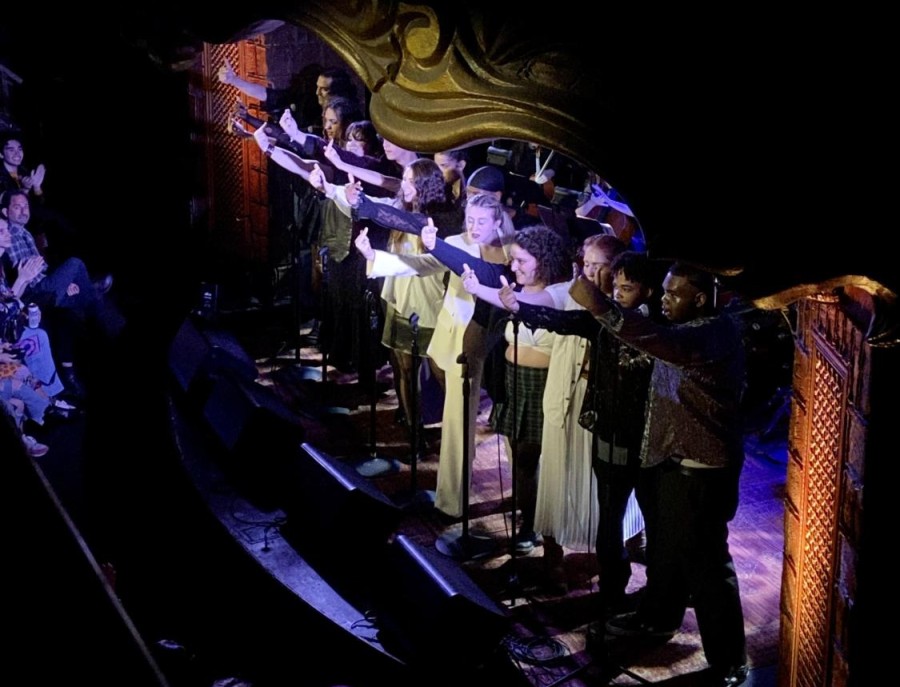Tisch New Theatre’s ‘Spring Awakening’ concert rocks on
Tisch New Theatre’s “Spring Awakening: In Concert” debuts a rockin’ production with stunning vocals.
“Spring Awakening: In Concert,” performed and directed by NYU students, delivers a whirlwind of emotions. (Courtesy of Lea Filidore)
November 15, 2022
Had Tisch New Theatre been putting on a traditional production of “Spring Awakening,” The Cutting Room might have felt like an untraditional venue for such a classic musical. But Tisch’s “Spring Awakening: In Concert,” an NYU student-led theater production, felt right at home in the classy, yet funky live music venue. The show was — as much as anything else — a rock concert.
The eclectic venue was packed with almost 350 people, jammed into rows of seats and leaning excitedly over mezzanine railings. The volume of people clamoring for a perfect view of the admittedly small stage was unsurprising, considering that the show sold out within hours of tickets going on sale. Yet the vast number of people in The Cutting Room only added to the anticipatory atmosphere.
A nine-piece band, composed of two drummers, two guitarists, two keyboardists, a bassist, a cellist and a violinist, stood atop the 28-by-16-foot wooden stage. The first jolting cord of the electric guitar marked the beginning of the show.
“Spring Awakening: In Concert” follows in the footsteps of the original 2006 musical and deals with heavy themes of rape, suicide, and sexual and domestic abuse. Despite — and perhaps because of — the weight of the topics, the show uses comedic moments to break up the intense themes and make them more digestible.
“It is about all these very dark and intense issues in society,” director Natalie Collat said. “Our production is a modern take on ‘Spring Awakening’ and a lot of the issues and the darkness of these young adults can really be translated through rock music.”
The show emphasizes the idea of showing instead of telling, leaving the more graphic actions and their devastating emotions implied rather than directly displayed.
“We wanted to adapt the wonderful poetic music of the show into a rock style concert in order to exemplify the emotions of these issues,” Collat said. “And along with that, craft our storytelling to match the appropriate type of storytelling that we need nowadays for these issues that we know very much about and see every single day.”
The performance pulled appropriate and cohesive songs from the classic production, intermixed with short bouts of dialogue that helped drive the storyline. Despite the disjointed nature of the intermingled writing and music, skilled production kept the story fairly clear, even to viewers who may not have had any previous exposure to “Spring Awakening.”
The show is divided into two halves, with a short intermission in between. The first act establishes the story, starting with a gripping performance of “Mama Who Bore Me” by Wendla (Deborah DosSantos), and the show steadily moves forward. The cast is full of strong voices and tremendous passion. The artists’ love for the production was palpable and easily reflected in their collective performance.
It should have been easy to lose the actors’ voices to the thundering instrumentals of the band. However, the voices of the performers were clear and powerful; the production maintained a good balance between music and vocals.
The show’s star number doesn’t make an appearance until act two. The production was, start-to-end, wonderful to watch. But nothing is more fun than watching “Totally Fucked,” in which 16 university students danced animatedly around a stage while singing “fuck” over and over again. The scene feels less like your classical musical production, and more like an intimate jam session.
Cast members poured into the aisles, executing smart dance moves while lamenting about the failures of the main character, Melchior. As the musical number progressed, the scene slowly devolved into a raw display of vocal talent. Powerhouses Elijah Johnson, Darcie A. Hingula, Lily Soto and Caroline Foster displayed their strengths through vocalization solos. “Totally Fucked,” which is one of two musical numbers that involve the full company, ended with every cast member collectively flipping the audience off. The audience aptly responded with a standing ovation.
In addition to housing a whopping vocal performance, “Totally Fucked” displayed the talents of the musicians on stage as well. With a memorable guitar solo, and other instrumental displays of brilliance, the band really had its moment to shine. Even though the band was a consistent genius backing the talented voices of the cast, it was nice to see a targeted spotlight on the musicians as they effortlessly moved the audience through the score.
The stage in The Cutting Room would be roomy for just a band, but adding over a dozen actors onto the platform made the space tight. Yet the strategic use of aisles and staircases made the stage seem boundless.
Likewise, with actors packed like Jenga blocks onto the stage, choreography can be undoubtedly limited. As a solution, production did away with most of the large, exaggerated moves and opted for smaller, more impactful movements instead — the deliberate grazing of hands, an intentional slamming of a book, loosely intertwined fingers or flowers placed gingerly atop worn-out wood.
As the lights in The Cutting Room dimmed for a final time and the last of the cast members had already head-banged their way off stage, I felt as if I had experienced every possible emotion in two hours. I had cried with Melchior, laughed with Moritz, and felt love like Hänschen and Ernst. Beyond all, I felt the incredible passion of the hard work that both the cast and crew had poured into the raw and intense production of “Spring Awakening: In Concert.”
Contact Lea Filidore at [email protected].
























































































































































